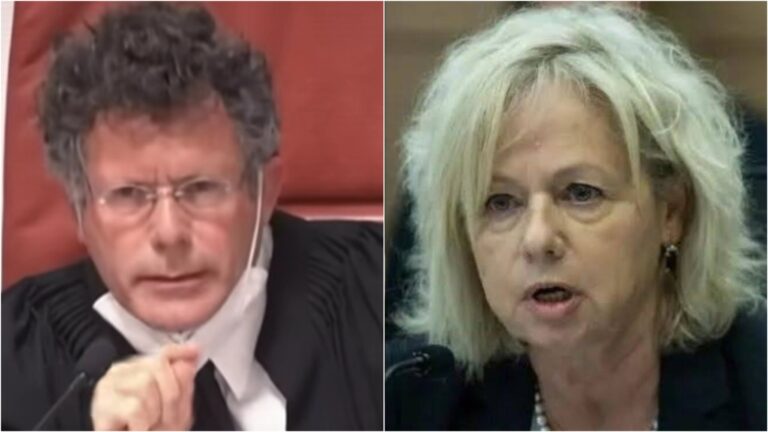By Rabbi Yair Hoffman for 5tjt.com
Former prime minister Naftali Bennett filed a NIS 1 million (over $292,000) defamation lawsuit this week against Rabbi Ronen Shaulov. Rabbi Shaulov is a baal teshuvah who has succeeded in inspiring thousands toward a religious life. The lawsuit was because the Rabbi had falsely claimed that Bennett’s parents, Myrna and Jim, were Reform Jewish converts and, therefore, not halachically Jewish.
Bennett claimed that the defamatory accusations were seen by at least 700,000 people. Bennett Rabbi Shaulov has more than 150,000 followers across a variety of social media platforms.
There are two halachic issues here. The first is that it is very wrong to call someone a different status than they are. The second issue is that it is forbidden to sue another Jew in secular court. Doing so is violation of a prohibition called going to “Arkaos.”
THE FALSE DEFAMATION PROHIBITION
The offending Rabbi should apologize to Bennett and perhaps review the pertinent section of the Talmud in Bava Metziah 58b:
Rabbi Yoḥanan says in the name of Rabbi Shimon ben Yoḥai: Greater is the transgression of verbal mistreatment than the transgression of monetary exploitation, as with regard to this, verbal mistreatment, it is stated: “And you shall fear Hashem.” But with regard to that, monetary exploitation, it is not stated: “And you shall fear Hashem.” And Rabbi Elazar said this explanation: This, verbal mistreatment, affects one’s body; but that, monetary exploitation, affects one’s money. Rabbi Shmuel bar Naḥmani says: This, monetary exploitation, is given to restitution; but that, verbal mistreatment, is not given to restitution.
The Gemara relates further: Anyone who humiliates another in public, it is as though he were spilling blood. Rav Naḥman bar Yitzḥak said to him: You have spoken well, as we see that after the humiliated person blushes, the red leaves his face and pallor comes in its place, which is tantamount to spilling his blood. Abaye said to Rav Dimi: In the West, i.e., Eretz Yisrael, with regard to what mitzva are they particularly vigilant? Rav Dimi said to him: They are vigilant in refraining from humiliating others, as Rabbi Ḥanina says: Anyone who descends to Gehenna ultimately ascends, except for three who descend and do not ascend, and these are they: One who engages with a married woman, as this transgression is a serious offense against both Hashem and a person; and one who humiliates another in public; and one who calls another a derogatory name. The Gemara asks with regard to one who calls another a derogatory name: Isn’t that identical to one who shames him; why then are they listed separately? The Gemara answers: Even though the victim grew accustomed to being called that name in place of his name, and he is no longer humiliated by being called that name, since the intent was to insult him, the perpetrator’s punishment is severe.
THE SECULAR COURT PROHIBITION
The prohibition of going to arkaos is found in two early sources. It is a braisah cited in tractate Gittin 88b as well as a Mechilta in the beginning of Parshas Mishpatim. The braisah cites Rabbi Tarfon who learns out of a verse in the Torah: “These are the laws that you shall place before them – before them, and not before gentiles.”
SHULCHAN ARUCH
The halachah is codified in the Choshen Mishpat section of Shulchan Aruch (26:1). It states, “It is forbidden to judge before gentile judges and their courts—even in regard to a law in which they follow Jewish law. This is true even if both parties wish to be judged in front of them. Whosoever brings a judgment before them is a rasha. It is as if he blasphemed and cursed and laid his hand upon the Torah of Moshe Rabbeinu.” The Rama adds that the person should be placed under a ban.
REASONS
There appear to be two reasons in the Rishonim for the prohibition. The Rambam (Sanhedrin 26:7) writes that one who does so is an evil-doer and it is as if he has blasphemed and cursed.. He has lifted his hand against the Torah of Moshe Rabbeinu. The Sma (CM 26:4) elaborates a bit more saying that it is as if he is saying that the Torah of Moshe Rabbeinu peace be upon him is not true.”
The Rashba, on the other hand, (Responsa Vol. VI #254) indicates that the reason is because the Torah wishes that every Jew be under the jurisprudence of the Torah and not a foreign set of laws.
The difference between these two reasons may be very significant (See Arkaos Bahalacha 1:3, by Rav Chaim Beinish). According to the Rambam the prohibition would be violated as soon as one sought redress in gentile court. According to the Rashba the prohibition is violated only when a decision is rendered. According to the Rashba, Bennet still has hope. He can undo it. According to the Rambam he violated it when he filed the lawsuit.
BIBLICAL OR RABBINIC?
Although the Gemorah in Gittin cites and expounds upon a Pasuk, the drasha seems not to expound upon the simple meaning of the Pasuk. Often this indicates that the halacha that is derived may actually be a debate among Poskim whether it is a Biblical law or a Rabbinic law. When we look at the Poskim we see that this is indeed the case.
The Radbaz (Responsa Vol I #172) writes that this is a Biblical law. Rav Shmuel Ben Yitzchok Sardi (1190-1256) author of the Sefer HaTrumos (62:1:4) cites a responsum of the Rif who rules that it is Biblical as does Rav Shimon Ben Tzemach Duran (1361-1444) in his Tashbatz (Vol. II #290). The Midrash Tanchuma in parshas Mishpatim also states that one who violates this “is violating a lav.” This can be understood as violating a negative commandmet attached to a positive commandment – but clearly it is Biblical. Rabbeinu Yonah (Shaarei Teshuvah 3:2) also writes that it is a Biblical violation.
On the other hand, the Avrohom Ben HaRambam in his commentary on the Torah (Mishpatim 21:1) writes that it is a Rabbinic violation. Rav Moshe Ben Yoseph Trani (1500-1580) also known as the MaBit in his Kiryat Sefer (Sanhedrin chapter 26) writes that it is a Rabbinic violation. The Sefer Mekor Boruch also understands it as a Rabbinic prohibition. The majority of Poskim, however, understand it as a full-fledged Torah prohibition.
REPERCUSSIONS OF ONE WHO SUES IN SECULAR COURT WITHOUT PERMISSION FROM BEIS DIN
The repercussions of suing someone in secular court without dispensation from Beis Din are most severe. Of course one should consult one’s own Rav or Posaik, but the following guidelines have been written by a number of Poskim:
One who does so is disqualified from being counted in a minyan (Kesef HaKadshim 26:1) [see, however, Divrei Yoel Vol. II 135:8], serving as a witness in a Beis Din [CM 34:2] (including at a wedding, on a Kesuvah, as an Aid Yichud), may not take an oath in a Bais Din (because he is suspected of falsely swearing), may not write a Sefer Torah, Tefillin or Mezuzos. He may also not serve as Shliach tzibbur on Rosh haShana and Yom Kippur and some say cannot do so during the week either. If it is a woman who has done so she is labelled as “one who has violated the religion.” [See Rabbi Akiva Eiger Tanina Siman 82].
STATUS OF A SECULAR AWARD
Any money that is awarded by a civil court that is above and beyond what he is entitled to according to Halachah is considered to be stolen (CM 26:4). Furthermore, one who brought such a suit may be liable for any costs that he caused the defendant to incur.
ENFORCING A PSAK BEIS DIN
What about going to court to enforce a ruling that was obtained in a Bais Din?
While pretty much most Poskim permit it, there is a debate as to whether it is preferable to get permission from a Beis Din to do so. The Knesses HaGedolah 26:14 cites the Rashach who permits it. The Maharsham IV(5):105 and Rav Vosner in Shaivet HaLevi Vol. X #263 also permits it. Rav Moshe Feinstein zt”l in Igros Moshe CM Vol. II #10 implies that it is preferable still to get specific permission from a Bais Din before going to secular courts.
CONCLUSION
Bennet should withdraw his lawsuit and issue a hazmana to Beis Din. The Rabbi should apologize for this horrific transgression and perhaps start giving shiurim on the severity of this prohibition.
The author may be reached at [email protected]












12 Responses
Ummm am I missing something? This rabbi claims that Bennet is a goy, why would he need to apologize unless he is incorrect. Surely this apology should be wholly dependant on whether or not this rabbi is telling the truth?
“If Bennet is a goy, why would he need to apologize unless he is incorrect”
If Bennet is a goy, there is no prohibition against him filing a lawsuit in secular court against the claim by this Rav.
Rabbi Hoffman, I have a number of questions.
1. Do you know for a fact that Bennett did not get permission? If Shaulov does not request to move the case to a bet din, would that be retroactively considered a refusal?
2. If Shaulov really thinks that Bennett is a goy, it would seem that he would not answer a hazmana. Would this give Bennett a presumption on which he could go straight to a secular court? Would he be considered a violent person being that he stated such vituperation to 700K followers?
3. In many such cases, the court refers the litigants to mediation. Does this make a difference?
4 Today, there is almost no such thing as being liable to a certain amount of money al pi din. The arbitration agreement states explicitly that the litigants accept whatever the dayanim decide, whether it’s din or peshara. Does this make a difference.
Areivim, Bennett is Jewish. If he were not, Shaulov would still have to apologize for saying lashon hara. It would be worse as it would be a chillul Hashem.
The Israeli courts are..
Lemaseh nowdays bes din has no authority unless both party agree to it and there is no chiyuv to listen to them and the מצוה of ועשית כל אשר יורוך only acording to the chinuch a mitzvah to listen to rabanim and acording to the רמב”ם to the bes din hagadol so whats the din nowdays?
Why was my comment censored? The Israeli courts are not erka’os shel goyim. That is obvious. They are included in לפניהם, which includes all Jews; and they are not included in ואויבינו פלילים
Does anybody here know whether Bennetts actually is Jewish?
Avi K:
1. I can all but guarantee you that if Bennet had a Hetter Arkansas it would be plastered all over, the language of Siruv V’Ikul that comes along with it is pretty sharp.
Not requesting to change the venue to a Bais Din would likely be seen as a sign of Shaulov understanding the reality that this request would be rejected out of hand both by the plaintiff (kind of an anti religious douche) and by the court (they don’t appreciate having their authority questioned.
2. The Batei Din have on occasion a case where a Goy brings a Jew in, and they still treat it s as any other case.
I believe you would still be obligated to respond to Beis Din even if the tovaia was a Goy.
3. Unless the court appointed mediators are a Beis Din, no.
4. This is based on the Poskim recommending aiming towards a peshara and not due to incompetence on the part of the dayanim. The arbitration agent you referenced is what gives a psak din the teeth today as without it the psak would be unenforceable in a secular world.
As for your last comment to areivim, if the allegation is true, that would simply be calling a spade a spade.
That would neither be lashon hara, nor a chillul Hashem.(although it might make Bennett mad and he might take out his revenge against the religious communities.
Gadolhadorah:
Correct, if he is indeed a goy there would be no prohibition, but there would also be no case.
You would not have a defamation case against me for saying you are a mammal, because you are one.
By the same logic if Shaulov were to call (Ahmed) Tibi a goy, there would be no defamation case either.
Millhouse: although you are correct that many of the jurors on the secular Israeli courts are ethnically Jewish, that doesn’t make them a Beis Din.
Even if you would seek out an all Jewish arbitration team you would still be violating this Halacha
Because no Charedim have ever taken their fellow Jews to court. Right.
Fakenews,
You obviously do not know the difference between mediation and arbitration. The former facilitate a mutually-agreed solution. The latter impose a solution. Many poskim even allow the latter as they do not rule according to a code of law but what they personally think is right in the case.
You also obviously do not know that Israel does not juries. Judges hand down verdicts in all cases.